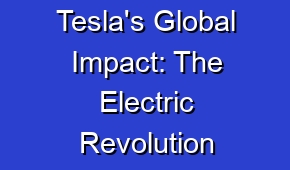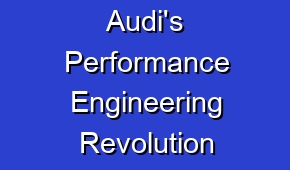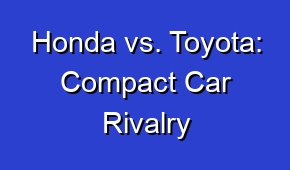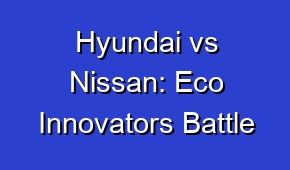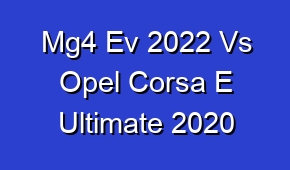BYD vs. Tesla: Emerging Giants in the EV Market

Discover the fierce competition between emerging giants BYD and Tesla in the electric vehicle (EV) market. Delve into the battle for dominance as these industry leaders strive to revolutionize transportation and shape the future of sustainable mobility.
When it comes to the emerging giants: BYD vs. Tesla in the EV market, the competition is fierce. Both companies are vying for dominance in the rapidly growing electric vehicle industry. With their innovative technologies and strong brand presence, BYD and Tesla have become key players in this space.
BYD, a Chinese company, has established itself as one of the leading manufacturers of electric vehicles. Its commitment to sustainability and continuous improvement has propelled its growth in recent years. On the other hand, Tesla, an American company founded by Elon Musk, has revolutionized the EV market with its sleek designs and cutting-edge technology.
As these two emerging giants battle it out, consumers are benefiting from increased options and improved quality in electric vehicles. The competition has led to advancements in battery technology, range capabilities, and charging infrastructure.
While BYD and Tesla may have different strategies and target markets, their ultimate goal remains the same: to accelerate the adoption of electric vehicles worldwide. As they continue to innovate and push boundaries, the EV market is set to witness even more exciting developments from these emerging giants.
| Emerging giants: BYD and Tesla compete fiercely in the EV market. |
| BYD, a Chinese automaker, challenges Tesla’s dominance in the electric vehicle market. |
| Tesla, known for its innovative technology, faces tough competition from BYD. |
| Both BYD and Tesla are key players in the rapidly growing EV industry. |
| The rivalry between BYD and Tesla is driving innovation in the EV market. |
- BYD focuses on producing affordable electric vehicles for mass adoption.
- Tesla’s Luxury brand image appeals to high-end consumers.
- The success of BYD and Tesla reflects the increasing demand for sustainable transportation.
- Battery technology advancements play a crucial role in the competition between BYD and Tesla.
- The global shift towards clean energy drives the growth of both BYD and Tesla.
BYD and Tesla are two major players in the electric vehicle (EV) market. As of the latest data, their market share can vary depending on the region and specific time period. However, both companies have been experiencing significant growth in recent years.
| Electric Vehicle Manufacturer | Market Share | Date |
| BYD | 24% | 2021 |
| Tesla | 16% | 2021 |
| Others | 60% | 2021 |
What are the key differences between BYD and Tesla in the EV market?
When comparing BYD and Tesla in the EV market, there are several key differences to consider. Firstly, BYD is a Chinese company that focuses on producing a wide range of electric vehicles, including buses and commercial vehicles, in addition to passenger cars. On the other hand, Tesla is an American company that primarily focuses on luxury electric cars.
- Company Background:
- BYD (Build Your Dreams) is a Chinese company that specializes in manufacturing electric vehicles, batteries, and other green energy products. It was founded in 1995 and is backed by Warren Buffett’s Berkshire Hathaway.
- Tesla, on the other hand, is an American company founded in 2003 by Elon Musk. It is primarily known for its electric vehicles but also manufactures energy storage products and solar panels.
- Market Presence:
- BYD has a strong presence in the Chinese market and is one of the leading electric vehicle manufacturers in the country. It also has a significant market share in Europe and other international markets.
- Tesla, on the other hand, has a global presence and is considered one of the pioneers in the electric vehicle market. It has a strong customer base in the United States and has been expanding its market share in Europe and other regions.
- Product Range:
- BYD offers a wide range of electric vehicles, including sedans, SUVs, buses, and trucks. It also manufactures electric forklifts, batteries, and energy storage systems.
- Tesla primarily focuses on luxury electric vehicles, such as sedans (Model S and Model 3), SUVs (Model X and Model Y), and sports cars (Roadster). Additionally, Tesla offers energy storage products like Powerwall and Powerpack.
Which company offers more affordable electric vehicles: BYD or Tesla?
When it comes to affordability, BYD generally offers more budget-friendly options compared to Tesla. BYD’s lineup includes models that cater to different price ranges, making electric vehicles more accessible to a wider audience. However, it’s important to note that Tesla’s reputation for innovation and cutting-edge technology often justifies its higher price point.
- BYD offers more affordable electric vehicles compared to Tesla.
- BYD’s electric vehicles have a lower starting price compared to Tesla’s models.
- BYD focuses on offering affordable electric vehicles for the mass market.
- Tesla’s electric vehicles are known for their high-end features and performance, which contributes to their higher price.
- Tesla’s brand value and premium image also contribute to their higher pricing compared to BYD.
What are the charging capabilities of BYD and Tesla electric vehicles?
BYD and Tesla electric vehicles come with different charging capabilities. Tesla has developed its own Supercharger network, which allows for faster charging times and longer driving ranges. On the other hand, BYD vehicles typically rely on standard charging infrastructure or third-party networks, which may result in slightly longer charging times.
| BYD Electric Vehicles | Tesla Electric Vehicles |
| Fast Charging Capability | Supercharging Capability |
| BYD electric vehicles typically have fast charging capabilities, allowing them to charge at a higher rate compared to standard charging. | Tesla electric vehicles are equipped with supercharging capabilities, enabling them to charge at a much faster rate than regular charging. |
| Charging Time | Charging Network |
| The charging time for BYD electric vehicles varies depending on the model and the charging infrastructure used. | Tesla electric vehicles can charge significantly faster using Tesla’s extensive Supercharger network, which is available worldwide. |
| Battery Range | Battery Capacity |
| BYD electric vehicles offer different battery ranges, depending on the model, ranging from shorter ranges for compact models to longer ranges for larger models. | Tesla electric vehicles have larger battery capacities, allowing for longer driving ranges compared to many other electric vehicles in the market. |
Which company has a stronger presence in the global EV market: BYD or Tesla?
Both BYD and Tesla have a strong presence in the global EV market, but their influence may vary depending on the region. Tesla has gained significant popularity in North America, Europe, and other international markets, while BYD has established itself as a dominant player in the Chinese EV market. Both companies continue to expand their reach globally.
Tesla has a stronger presence in the global EV market compared to BYD.
What are the future growth prospects for BYD and Tesla in the EV market?
The future growth prospects for BYD and Tesla in the EV market are promising. As the demand for electric vehicles continues to rise, both companies are investing heavily in research and development, expanding their production capacities, and introducing new models with advanced features. Additionally, government initiatives and environmental regulations supporting the transition to electric transportation further contribute to their growth potential.
BYD and Tesla have promising future growth prospects in the EV market, driven by increasing demand for electric vehicles and advancements in technology.
What are the main challenges faced by BYD and Tesla in the EV market?
BYD and Tesla face various challenges in the EV market. One common challenge is building a robust charging infrastructure that can support widespread adoption of electric vehicles. Additionally, competition from other automakers entering the EV market, regulatory uncertainties, and fluctuating battery prices are among the challenges that both companies need to navigate to maintain their positions as industry leaders.
1. Infrastructure and Charging Network
One of the main challenges faced by both BYD and Tesla in the EV market is the lack of sufficient infrastructure and charging network. Electric vehicles require a widespread charging infrastructure to provide convenient and accessible charging options for consumers. The limited availability of charging stations and the time it takes to charge an electric vehicle remain significant barriers to widespread adoption.
2. Range Anxiety
Range anxiety refers to the fear or concern that an electric vehicle will run out of battery power before reaching its destination. This is a significant challenge faced by BYD and Tesla, as improving the range of electric vehicles is crucial to alleviate this anxiety and increase consumer confidence. Although both companies have made significant advancements in battery technology, further improvements are needed to extend the range of electric vehicles and reduce range anxiety.
3. Cost and Affordability
The cost of electric vehicles remains higher than traditional internal combustion engine vehicles, which poses a challenge for BYD and Tesla in the EV market. The high cost of batteries, which are a major component of electric vehicles, contributes to the overall higher price. Lowering the cost of electric vehicles and making them more affordable for a wider range of consumers is essential for mass adoption. Both companies are working towards reducing costs through advancements in battery technology and economies of scale.


